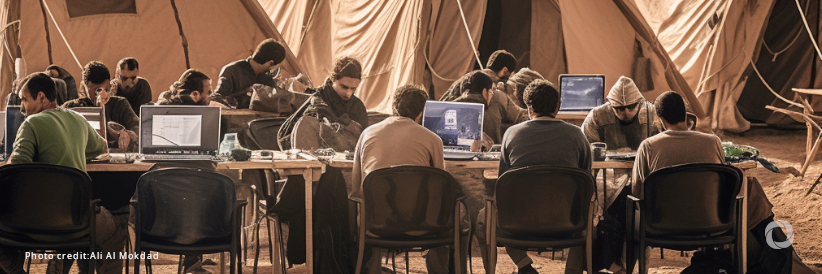As I envision the future of the humanitarian sector, particularly the technical and managerial roles, I see a landscape that is evolving, with new skills becoming as essential as the ability to use Microsoft Office or basic computer skills are today. One such skill, which may not be a requirement at present but I firmly believe will be in the future, is the ability to prompt effectively. This skill, while seemingly simple, has the potential to revolutionize how we communicate and adapt in an increasingly digital and AI-driven world.
This article is not built on a foundation of extensive research; rather, it is a projection of my vision for the future humanitarian professional. It’s a glimpse into what I believe will be the new norm in the sector. While I have many more thoughts on this subject, I will reserve them for future discussions to keep our focus sharp.
In my previous roles, I’ve been responsible for hiring managers and technical advisors. The recruitment process often involved technical tests to evaluate candidates’ writing skills, analytical abilities, and attention to detail. These tests played a crucial role in identifying the right talent for our organization. Reflecting on these experiences, I foresee a shift in our approach to future recruitment. I anticipate that the technical tests of tomorrow will include assessments of candidates’ ability to craft effective prompts.
While this may seem unconventional today, I believe it will become as standard as our current expectations for computer literacy and writing skills. That is, of course, if we decide to continue with such tests! I say this because I see the potential of AI to streamline our work, especially in technical roles that require writing, editing, planning, and more. AI can help us act faster and more efficiently, and prompting is a key skill to leverage this potential.
Understanding Prompting
To describe the concept of prompting in a simple and easy way, think of it as the art of communicating with machines using natural language processing. It does away with the need for pre-defined routines or commands and brings a level of intuitiveness to AI. For example, when you interact with an AI like ChatGPT, the way you phrase your prompt or question can significantly influence the AI’s response. This skill, a blend of logic, coding, and art, is becoming increasingly important in the AI and technology sectors.
The Role of Prompting in the Humanitarian Sector
In the humanitarian sector, one might wonder, what is the role of prompting and how can it enhance communication, problem-solving, and adaptability? Consider this scenario: you’re coordinating emergency response efforts and the ability to prompt effectively leads to clearer instructions, a better understanding of complex situations, scenario planning and contingency, and more efficient decision-making. It’s a game-changer.
Prompting can also enhance interactions between different teams, stakeholders, and even AI tools that are being increasingly used in the sector. For instance, when writing a proposal for a new project, a well-crafted prompt can help an AI tool generate key sections of the proposal, such as the project objectives, activities, and expected outcomes. This not only saves time but also ensures a high-quality proposal that aligns with the donor’s requirements.
As we look towards the future, we see the role of prompting expanding to technical program roles, business development, grants and projects management, and people management, the ability to prompt effectively will become a crucial skill. As we use more and more AI tools for various tasks, being able to prompt these tools efficiently will be an advantage. This change means we need a new kind of literacy, one where we know not only how to use these tools but also how to communicate with them effectively. This will require training, practice, and a shift in mindset. But the benefits, I believe, will far outweigh these challenges.
Final Thoughts
Prompting is more than just a skill; it’s a new way of thinking and communicating that can revolutionize the way we work in the sector. As I continue to explore the intricacies of prompting, I have come to realize its immense potential for transforming our work in the humanitarian sector. My vision for the future involves incorporating prompting as a crucial cross-cutting skill in the capacity development plans of our employees and our local partners. This would involve conducting training sessions and creating specialized courses specifically designed for humanitarians, in order to make it an integral part of the toolkit we use for our operations and strategic planning. It is not just about my personal experience with prompting, but rather about recognizing its potential and making it accessible to others in the sector. By constantly learning and practicing, we can harness the full power of this skill.
As we navigate the future, let’s not just adapt to change; let’s anticipate it. I encourage you to reflect on this and find ways to read and learn more about crafting a good prompt.

